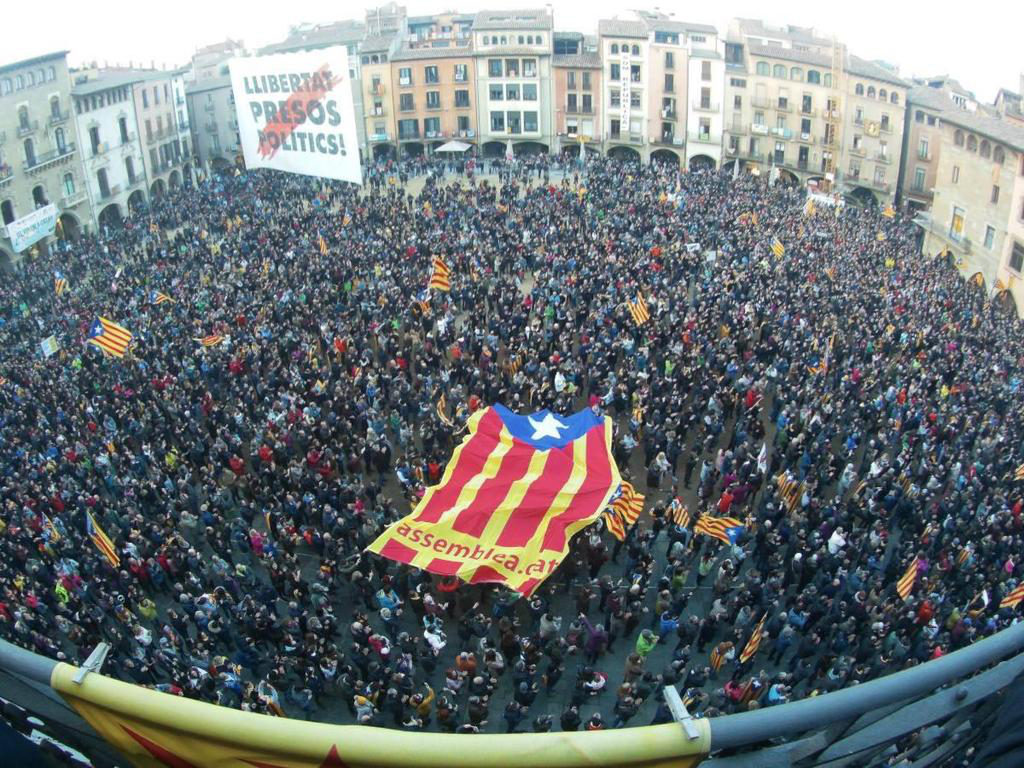21.02.2019 - 21:40
|
Actualització: 21.02.2019 - 22:40
Thousands took to the streets in Barcelona and other Catalan cities on Thursday during a general strike called coinciding with the trial against Catalan independence pro-independence leaders. Several protests and disruptions began early in the morning, with dozens of roads cut across Catalonia during the morning peak hour, including the AP-7 highway and other key roads, such as the A-2, C-60 and C-58. Official numbers in the evening said that 40,000 people protested in Barcelona, 70,000 in Girona, 9,000 in Tarragona and between 6,000 and 10,000 in Lleida.
While not formally called for this reason—strikes cannot be called for political reasons—the underlying aim is to protest the proceedings against 12 pro-independence leaders tried in Madrid for calling a referendum and declaring independence in 2017.
The Catalan labor ministry estimates that some 67% of people adhered to the strike in universities, 28% in schools, 30% in businesses, 24% in public services, and 8% in healthcare.
Metros and trains affected
By 11am, 500 people had already gathered in Barcelona’s Plaça Urquinaona. Then, at around 1pm, protesters also cut two Renfe train lines in the central Plaça Catalunya station. More actions planned include a march at 6pm at Jardinets de Gracia off of the main Diagonal avenue.
According to the Catalan road traffic authority, the mobility in Barcelona’s metro area fell by 11.4% in comparison with a normal Thursday.
Protester arrested for punching police officer
During the protests in the Catalan capital, a demonstrator was arrested for punching a police officer. In the early afternoon, there was tension and between the Catalan police and student protesters on Passeig de Gracia avenue, with law enforcement using batons against demonstrators.
In the late morning, the Catalan police charged at protesters blocking the AP-7 highway in Medinyà, in northern Catalonia, while some fifteen roads were still cut at around 10.30am.
The far-left CUP party was critical of the police clashes seen on February 21, even requesting that the Catalan government dismiss its home affairs minister Miquel Buch. CUP MP Maria Sirvent accused the government of “on one hand supporting this general strike,” while on the other “repressing those who protest, those who take to the streets to defend their rights.”
Hundreds mobilize in northern Girona
Meanwhile in Girona, close to Medinyà, some 300 protesters blockaded the main entrance to the city, with some moments of tension between them and some workers of department stores.
By noon, some 900 people had gathered at the Catalan government headquarters in Girona, chanting “independence” and “freedom for political prisoners.”
Tarragona, Lleida, Reus, Vilanova i la Geltrú, Reus, Figueres, Valls, and Tortosa, are among dozens of towns also hosting demonstrations against the trial throughout Thursday.
Original statement
In an original statement about the strike, which was at first called for the first dates announced for the trial on February 5, the union Intersindical-CSC said that among the aims of the industrial action are “the complete repeal of the 2012 labor reform, a minimum salary in Catalonia of 1,200 euros a month, and the recovery of social legislation passed by the Catalan Parliament and suspended by the Constitutional Court,” among others.


